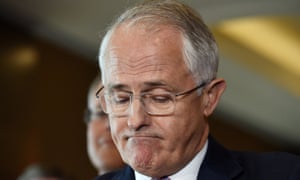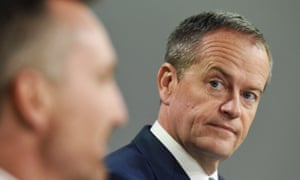Taxing Times: Panama Papers, High-wealth Individuals avoid Income Tax
This provides insight into one rule for us and one rule for the wealth and power elites. Below is a video from Mila Melnikoff speaking about her experience in Russia, deregulation and Star Technologies of which Malcolm Turnbull was a director.
https://www.theguardian.com/australia-news/2016/apr/08/panama-papers-boost-malcolm-turnbulls-chances-of-falling-into-labors-tax-trap
Panama Papers make Bill Shorten’s election sales pitch less taxing
Labor is trying to flip Australia’s traditional economic debate on its head and revelations of large-scale tax avoidance will only help them
The Panama Papers have not ensnared Australian political leaders or brought protesters onto the streets, as they did in Russia or Iceland, but they could still have a powerful impact on this year’s election.
That’s because they bolster the tax narrative that Labor is using to try to flip Australia’s traditional economic debate on its head.
The central economic pitches in this election are cleaving along unusually ideological lines and run something like this.
Labor will close tax loopholes and use the money to pay for things like hospitals and schools.
The Coalition will close some tax loopholes and cut some spending and use the money for things that generate economic growth, including infrastructure and innovation and cities, and possibly future company tax cuts, because then, in the long term, we’ll have growing tax revenue to pay for hospitals and schools while “living within our means”.
As I wrote last month, the Labor formulation sits with a growing new political consensus that rising inequality harms growth and smart social spending should not be the kindly thing governments do after they raise the revenue but, rather, a first-order revenue-boosting exercise in itself.
The Coalition’s stance fits the old conventional wisdom that economic growth is best achieved by market deregulation, lower taxes and lower spending that generate growth, allowing “all boats to rise” and providing the tax revenue for governments to pay for social programs and do something about poverty.
But even if you accept the Coalition’s ideological view of the world, the logic breaks down if the companies and wealthy individuals benefiting from the economic growth don’t actually pay much tax. Then all boats don’t rise. Then the ordinary PAYG taxpayers are stuck in a fiscal dry dock – the schmucks who pay their full tax obligations and also suffer because they rely on the public services that governments still can’t afford to provide.
And the Panama Papers are 11m more pieces of evidence suggesting to the schmucks that the system is having them on, that if they had enough money and good enough tax advisers they too could set up some complicated international structure with a tropical island post box and pay no tax.
The leak comes on top of data showing 98 of the biggest Australian private companies paid no tax in 2013. They may have had legal offsetting losses but that revelation created a powerful impression all the same.
And it comes on top of the extraordinary revelations from the Senate committee on tax avoidance, which – Sam Dastyari, its Labor chair, now says – may reconvene to take evidence on what the Panama Papers tell us about high-wealth individuals avoiding income tax.
So far it has already provided a vivid picture of the tax that is not being paid by multinationals and mining companies such as Apple, Google, Chevron, BHP Billiton and Rio Tinto, and the lengths they go to try to minimise it.

Last year the government passed anti-tax avoidance tax laws, applying from last month, which say to 1,000 companies with more than $1bn in revenue that if they enter into complicated arrangements with the primary purpose of avoiding tax they will still get taxed in Australia.
In February the tax commissioner, Chris Jordan, said he had run out of patience with multinational companies using “over the top excuses” to “string along” the tax department, “game the system” and avoid complying with the new laws.
“The excuses we hear from these companies are, frankly, over the top … Their clear tactic is to delay and obstruct. They game the system. They even have the gall to complain that we are uncooperative and unreasonable simply because we don’t agree with them or their advisers on what are, at times, quite outlandish claims,” he said, promising he would be quicker in the future to take cases to court.
Meanwhile, Labor has a policy to raise $1.9bn over three years, mainly from reducing the allowable debt to fund the Australian operations of a multinational company to the same gearing level as the global group.
But the power of the Panama Papers and all the other tax avoidance revelations, and the political reactions to them, is as much about how they help or hinder the major parties’ central economic arguments as about the actual amounts of tax avoided or clawed back.
Labor’s policy, for example, is clearly not the fiscal cure-all its leader, Bill Shorten, suggests with his stock answer that he’ll “make multinationals pay their fair share” when asked how he will pay for his spending commitments.
Just as his negative gearing and capital gains tax policy is not only about raising another $500m over the forward estimates ($32bn over the decade) towards the $4.5bn extra Labor is promising for schools and the as-yet-unspecified amount of extra funding they will promise for hospitals. It also allows him to say – every time it is raised – that Labor wants to make sure that “first-home owners can compete to buy their first home on a level playing field with property speculators going for their 10th property”.
Labor’s tax cuts are, quite deliberately, progressive but in every instance Shorten frames them as affecting only the tax avoiders, the very rich – the spivs not the schmucks.
So when the treasurer, Scott Morrison, turns up to insist (contrary to available evidence) that Australia does not have a revenue problem as well as a spending problem, and to claim that Labor wants to impose $100bn in taxes on ordinary Australians who are already being taxed quite enough, and to sneer that if the Labor leader “in his ill-fitting suits” thinks that is a way to grow the economy then he has “got rocks in his head”, a lot of those listening to him will have already formed the view that the extra taxes won’t hit them and will hit people wearing very well-fitting suits who damn well deserve to pay them.
And when the prime minister, Malcolm Turnbull, labels promised extra funding on schools and hospitals and the national disability scheme a “fantasy” – even when he is armed with Treasury costings about their eye-popping long-term draw on the budget – at least some of those listening will have already formed the view that the so-called “fantasy” can become a reality so long as rich individuals and companies pay their way. Then Labor goes the next step, framing Turnbull himself as “out of touch”, which is not-very-subtle code for “on the side of the rich tax avoiders rather than the schmucks”.
Labor’s call for a royal commission into the string of scandals in the banking industry is also on script and the Coalition’s reaction is, once again, confused. Turnbull had some harsh words for the banking industry this week but Morrison responded to Labor’s idea by labelling it a “distraction” that would put confidence in the banking industry “at risk”. As if the scandals hadn’t already done that.
Political messaging always simplifies policy realities, forces them into a moral, value-laden frame even if every single factual detail doesn’t actually fit. The government’s message is that Labor is an economic risk, a spendthrift endangering the country’s finances. After locking in “no revenue problem” as the starting point for its own policy, the government hasn’t really got any other choice. Labor’s message is that it puts real people and the services they need ahead of the interests of big tax-avoiding multinationals and the rich.
Even if the Panama Papers don’t have the same immediate impact in Australia as they have had overseas, they provide more evidence that helps Labor’s framing.
